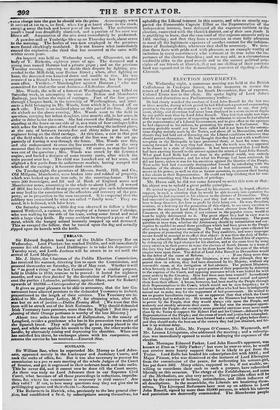ItILAND.
Sir Edward Sugden took leave of the Dublin Chancery Bar on Wednesday. Lord Plunkett has reached Dublin, and will immediately resume his old duties. Lord Haddington is to take his departure on Tuesday next, and Lords Justices will be sworn in to act until the arrival of Lord Mulgrave.
Mr. J. Haire, the Chairman of the Dublin Election Commission, has received his warrant, directing him to open the Commission, and proceed thereunder on Saturday, the 2(1 of May next. Whether it will be "as good a thing" as the last Commission for a similar purpose, held in Dublin in 1810, remains to be proved : it lasted for eighteen . months, and was then finished by the.dissolution of Parliament ; and cost the parties ( Latouche, petitioner, against Shaw, now Sir Ruben.) upwards of 10,000/.— Correspondent of the Standard.
It gives us great pleasure to be able to announce, that the late Go- vernment have allowed pensions to the disbanded Yeomanry in Ireland, proportioned to the length of their services. The Yeomanry are in- debted to Mr. Anthony Lefroy, M. P. for obtaining what, after all, WAS but an act of justice.—Dublin Evening Mail. [ We trust that this item will be struck out of the Irish Estimates. Why should disbanded Irish Yeomanry have pensions, more than the English ? But this pen- „sioning of their Orange partisans is worthy of the late Ministry.]
About two miles from the town of 13allymahon, in the county of Longford, resides a gentleman who has in his possession two mules of the Spanish breed. They will regularly go to a pump placed in the yard, and while one applies his mouth to the spout, the other works the handle, by alternately raising and depressing his shoulder. When one has satisfied his thirst, he exchanges places with his companion, and xetunes the service be has received.—Limerick Star.


























 Previous page
Previous page